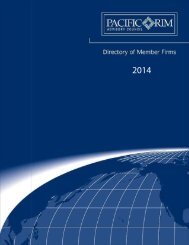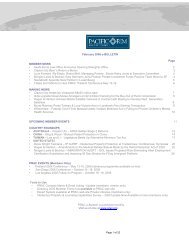A Guide to the Law of Securitisation in Australia - Clayton Utz
A Guide to the Law of Securitisation in Australia - Clayton Utz
A Guide to the Law of Securitisation in Australia - Clayton Utz
- No tags were found...
You also want an ePaper? Increase the reach of your titles
YUMPU automatically turns print PDFs into web optimized ePapers that Google loves.
It is said that <strong>the</strong> limitation on <strong>the</strong> trustee’s liability <strong>to</strong> <strong>the</strong> assets<strong>of</strong> <strong>the</strong> trust constitutes an order <strong>to</strong> pay out <strong>of</strong> a particular fund.Section 8(3) <strong>of</strong> <strong>the</strong> Bills <strong>of</strong> Exchange Act deems such an ordernot <strong>to</strong> be unconditional as <strong>the</strong> fund may be <strong>in</strong>sufficient <strong>to</strong> pay <strong>the</strong>amount on <strong>the</strong> face <strong>of</strong> <strong>the</strong> <strong>in</strong>strument. It is also argued that <strong>the</strong>effect <strong>of</strong> <strong>the</strong> limitation on <strong>the</strong> trustee’s liability is that <strong>the</strong><strong>in</strong>strument cannot be for a sum certa<strong>in</strong> as <strong>the</strong> amount that <strong>the</strong>holder will be entitled <strong>to</strong> on maturity depends upon assets <strong>of</strong> <strong>the</strong>trust be<strong>in</strong>g available at that time.The alternative view is that when a trustee <strong>of</strong> a trust signs apromissory note conta<strong>in</strong><strong>in</strong>g a limitation on its liability, it does so<strong>in</strong> a representative character which is authorised by section 31(1)<strong>of</strong> <strong>the</strong> Bills <strong>of</strong> Exchange Act. Although <strong>the</strong>re is case law <strong>to</strong>support this proposition, it is very old and predates <strong>the</strong> statu<strong>to</strong>rycodification <strong>of</strong> <strong>the</strong> rules relat<strong>in</strong>g <strong>to</strong> promissory notes <strong>in</strong> <strong>the</strong> Bills<strong>of</strong> Exchange Act (and its English predecessor).The reason<strong>in</strong>g <strong>in</strong> <strong>the</strong>se cases is also not particularly clear and<strong>the</strong>re is no certa<strong>in</strong>ty whe<strong>the</strong>r <strong>the</strong>y would be followed if <strong>the</strong>situation was exam<strong>in</strong>ed by <strong>the</strong> courts <strong>to</strong>day. While <strong>the</strong>re aregrounds for conclud<strong>in</strong>g that trustees can issue promissory notesconta<strong>in</strong><strong>in</strong>g a limitation on <strong>the</strong>ir liability, this issue attractsconsiderable attention where it is proposed. In order <strong>to</strong> avoidthis, unless it is essential, it is probably better <strong>to</strong> structure atransaction on <strong>the</strong> basis that <strong>the</strong> <strong>in</strong>struments <strong>to</strong> be issued by <strong>the</strong>trustee are not, for legal purposes, promissory notes. Most <strong>of</strong> <strong>the</strong>advantages <strong>in</strong> us<strong>in</strong>g promissory notes can be achieved <strong>in</strong> o<strong>the</strong>rways, avoid<strong>in</strong>g undue legal attention on <strong>the</strong> <strong>in</strong>tegrity <strong>of</strong> aproposal based on <strong>the</strong> purported issue <strong>of</strong> promissory notes by atrustee.10.5 Can trustees purchase <strong>the</strong>ir own securities?With <strong>the</strong> enormous growth <strong>of</strong> managed and superannuationfunds over <strong>the</strong> last few years, <strong>the</strong>se are becom<strong>in</strong>g an <strong>in</strong>creas<strong>in</strong>glyimportant market as purchasers <strong>of</strong> securitised <strong>in</strong>struments.However, <strong>in</strong> <strong>Australia</strong> we have a very concentrated pr<strong>of</strong>essionaltrustee company <strong>in</strong>dustry. Often, <strong>the</strong> same trustee company willwish <strong>to</strong> acquire <strong>in</strong> <strong>the</strong> open market for a managed fund <strong>the</strong> debtsecurities it issued as trustee <strong>of</strong> a securitisation trust. This <strong>the</strong>nraises <strong>the</strong> issue <strong>of</strong> what are <strong>the</strong> consequences (if any) if thisoccurs?The position <strong>of</strong> a company which acquires its own debt securities,and <strong>the</strong>n subsequently transfers <strong>the</strong>se <strong>to</strong> ano<strong>the</strong>r, was considered<strong>in</strong> Re George Routledge & Sons Limited [1904] 2 Ch. 474.The facts <strong>of</strong> <strong>the</strong> decision were as follows: A company issued aseries <strong>of</strong> first mortgage debentures. From time <strong>to</strong> time some <strong>of</strong><strong>the</strong>se came <strong>in</strong><strong>to</strong> <strong>the</strong> market and 16 were purchased back by <strong>the</strong>company. They were transferred from <strong>the</strong> sellers <strong>to</strong> <strong>the</strong> companyand <strong>the</strong> company’s name was entered upon <strong>the</strong> register <strong>of</strong>debenture holders. Subsequently, <strong>the</strong> company transferred <strong>the</strong>debentures that it had acquired <strong>to</strong> various third parties.The issue before <strong>the</strong> court was whe<strong>the</strong>r <strong>the</strong> purchasers wereentitled <strong>to</strong> be treated as holders <strong>of</strong> <strong>the</strong> debentures acquired from<strong>the</strong> company. The court held that <strong>the</strong> purchasers had not acquired<strong>the</strong> debentures.The reason<strong>in</strong>g <strong>of</strong> <strong>the</strong> court was that <strong>the</strong> debentures, when <strong>the</strong>ywere acquired by <strong>the</strong> company, ceased <strong>to</strong> exist. The companycould not at <strong>the</strong> same time be both a deb<strong>to</strong>r and credi<strong>to</strong>r <strong>to</strong> itself.As <strong>the</strong> debentures had ceased <strong>to</strong> exist, <strong>the</strong>y could not bepurchased by <strong>the</strong> third parties. The purchasers acquired noth<strong>in</strong>g(except an unsecured claim aga<strong>in</strong>st <strong>the</strong> company for breach <strong>of</strong> <strong>the</strong>contract <strong>of</strong> purchase).The decision <strong>in</strong> Re George Routledge & Sons Limited raises <strong>the</strong>prospect that when a trustee purchases its own debt securities,<strong>the</strong>se are ext<strong>in</strong>guished. If this is <strong>the</strong> case, <strong>the</strong>n it would strictlyseem that <strong>the</strong> trustee, <strong>in</strong> its capacity as trustee <strong>of</strong> <strong>the</strong> purchas<strong>in</strong>gtrust, is not entitled <strong>to</strong> payment <strong>of</strong> any pr<strong>in</strong>cipal or <strong>in</strong>terest or <strong>to</strong><strong>the</strong> benefit <strong>of</strong> any o<strong>the</strong>r rights accru<strong>in</strong>g under <strong>the</strong> debt security. Inaddition, it cannot sell <strong>the</strong> debt security <strong>to</strong> a third party for, as<strong>in</strong>dicated above, <strong>the</strong> purchasers are at law acquir<strong>in</strong>g noth<strong>in</strong>g.This <strong>in</strong> turn would expose <strong>the</strong> trustee for an action <strong>in</strong> damagesfrom <strong>the</strong> purchaser for fail<strong>in</strong>g <strong>to</strong> deliver <strong>the</strong> debt security.It is quite conceivable given fluctuations <strong>in</strong> <strong>in</strong>terest rates, andperhaps <strong>the</strong> addition <strong>of</strong> <strong>in</strong>terest at <strong>the</strong> relevant Supreme Courtrate, that <strong>the</strong> amount <strong>of</strong> damages owed by <strong>the</strong> trustee couldexceed <strong>the</strong> purported sale price <strong>of</strong> <strong>the</strong> debt security. This <strong>the</strong>nraises <strong>the</strong> issue <strong>of</strong> from which trust would <strong>the</strong> trustee be entitled<strong>to</strong> obta<strong>in</strong> recoupment, <strong>the</strong> orig<strong>in</strong>al securitisation trust or <strong>the</strong>purchas<strong>in</strong>g (and sell<strong>in</strong>g) trust?It would be no overstatement <strong>to</strong> state that <strong>the</strong>se consequencesdiverge from <strong>the</strong> expected commercial consequence that <strong>the</strong>trustee should be able <strong>to</strong> hold <strong>the</strong> debt security and receive<strong>in</strong>terest and pr<strong>in</strong>cipal on it from <strong>the</strong> securitisation trust and <strong>the</strong>trustee should be able <strong>to</strong> validly assign <strong>the</strong> debt security <strong>to</strong> athird party.61






